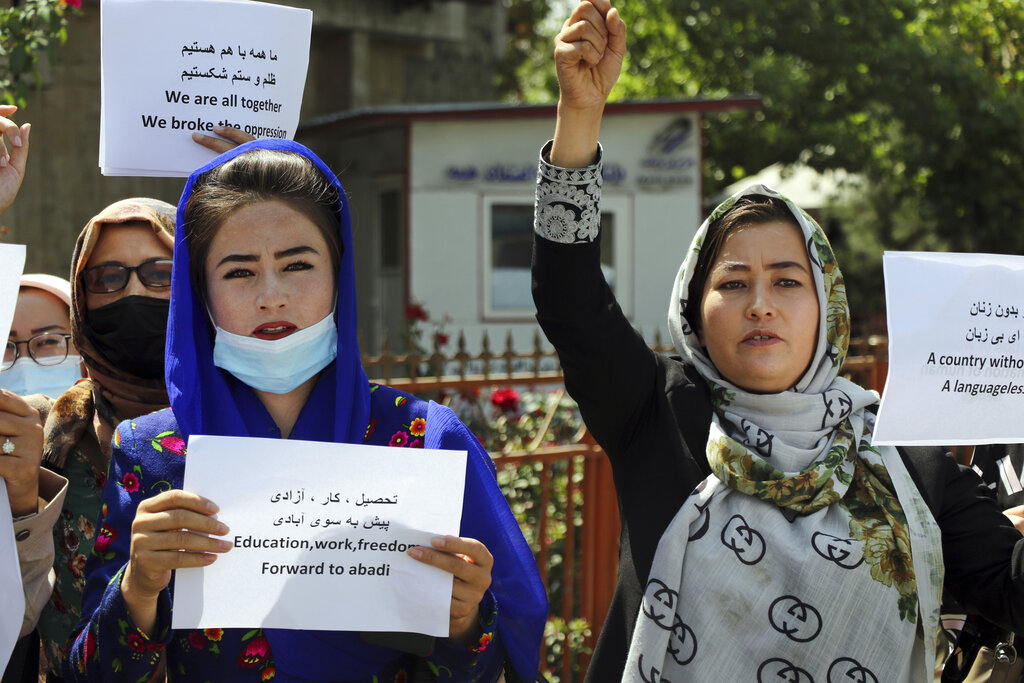Report
Taliban, still without a government, crush women’s protest with bloody repression
Dozens of women returned to demonstrate in the streets of the capital, not far from the Arg, the presidential palace. This time, the Taliban response was heavy-handed.

Afghan women are once again protesting, and the Taliban have used strong-arm tactics to disperse a demonstration in Kabul. For now, their government remains only on paper, the Panjshir province is still hanging in the balance, disputed between the leaders of the “Resistance” and the forces of the Taliban, and Antonio Guterres, Secretary General of the United Nations, has convened a conference on the humanitarian crisis in Afghanistan on September 13.
After the protests in Herat and Kabul, on Saturday dozens of women returned to demonstrate in the streets of the capital, not far from the Arg, the presidential palace conquered by the Taliban on August 15, bravely demanding their rights and freedoms. This time, the Taliban response was heavy-handed: first they took away their megaphone, then they beat up some of the women. Among them was the activist Rabia Sadat, who was filmed after the demonstration with blood covering part of her face. She said she refused to hide and was ready to go back into the streets.
There were also small demonstrations by women in Zaranj, the capital of the south-western province of Nimruz, on the border with Iran, the first town to come under Taliban control at the beginning of the military offensive that led them to conquer Kabul. There is still no central government – its announcement has been postponed, along with the related ritual celebrations.
After three weeks since taking power and after 20 years of jihad against the Americans and the puppet “administration,” the Koranic students still haven’t been able to agree on the composition of the government. There are several reasons for this. The first is the speed with which they routed the Afghan army and with which the institutions of the Islamic Republic collapsed. Then, there was the need to wait for the foreign troops to complete their withdrawal. Now it is mostly on account of internal divisions. These were contained while the goal was driving out the enemy, but are exploding now that the focus turns to dividing up the spoils: ministerial posts, material interests, status and prestige.
One of the main fault lines is between the wing connected to Mullah Abdul Ghani Baradar, who represents the old guard and the militants in the south of the country, and that of the Haqqani Network, the Taliban in the east, more extremist, but who have managed to occupy de facto positions of power in Kabul and elsewhere during this period. Few are disputing that Mullah Baradar, the diplomatic face of the Taliban and the architect of the Doha agreement with Washington, will have the leading role.
But the other executive and ministerial posts are being disputed. There is also a split between those who think that the Taliban should get all the posts and those who think that there should be at least a formal representation for the other political groups, defeated militarily. But the Taliban are assuring that the government will be in place and functioning within a few days.
The Pakistani general Faiz Hameed, head of the Inter-Services Intelligence, the powerful and feared military intelligence services of the “Land of the Pure,” will also offer his own input. In recent years, Islamabad has constantly cultivated close relations with the Taliban.
Now things are changing: from offering underground support to a group of insurgents, Pakistan is moving to explicit support for the de facto authorities of the country. On Saturday, the general’s arrival in Kabul was seized on by those who see the Taliban as an export product of Islamabad. This interpretation is reductive, but it does contain elements of truth.
Beyond the propaganda war, just as important is the war that continues to be fought in the Panjshir province. For the first time in the history of the Afghan conflict, the Taliban have reached Anabah, where Emergency has been running a hospital since 1999. According to some reports, as of the writing of this article, the Islamist militants are aiming to attack the provincial capital, Bazarak. It is difficult to verify the information: for many weeks now, both sides have been mobilizing, threatening and boasting, both through the media and social media.
But this fight is symbolically crucial: without Panjshir, the Taliban’s claim to control the country remains partial. They prematurely celebrated the conquest of the valley two days ago, with gunfire and rockets: there were 17 people killed and 42 wounded in the celebrations, condemned by the leadership, which is starting to crack down on the low-ranking militants, who are difficult to hold in line. The last stronghold of the resistance, Panjshir, is isolated from the rest of the country, said former vice-president Amrullah Saleh, according to whom the Taliban are preventing the entry of food, medicine and humanitarian aid into the valley.
On Saturday, due to the serious humanitarian crisis in the country, UN Secretary General Antonio Guterres has scheduled a conference for September 13. He is asking that the international community should do more, and soon, to support the Afghan population. A good half of them, 18.5 million people, are in need of humanitarian assistance.
Originally published at https://ilmanifesto.it/kabul-secondo-giorno-di-protesta-delle-donne-repressione-talebana/ on 2021-09-05
